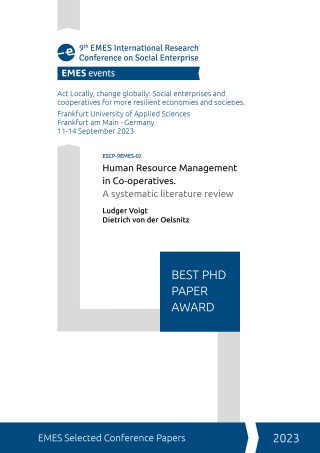Abstract
Cooperatives, as democratic organizations owned and controlled by members, present unique challenges for human resource management (HRM) due to their focus on different stakeholder interests and the distinction between member and non-member employees. With sustainability and a multi-stakeholder perspective gaining importance in HRM research, cooperatives offer an ideal context to explore these developments. Through a synthesis of existing literature, in this review we develop a HRM model specifically tailored to cooperatives. It highlights how the distinctive characteristics of cooperatives, such as member self-leadership, self-control, and adherence to cooperative values and principles, shape HRM policies and practices. The findings contribute to the understanding of sustainable HRM and provide implications for future research in this area.




